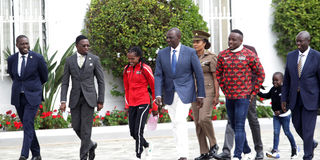Athletes’ welfare must be at core of sports management

From left: Nairobi County Governor Johnstone Sakaja, Sports CS Ababu Namwamba, double world record holder Faith Kipyegon, President William Ruto, Africa 100m champion Ferdinand Omanyala and Deputy President William Ruto at State House, Nairobi on June 13, 2023.
What you need to know:
- A running thread in these charters is the centrality of the athletes in governance structures and the importance of their contribution to matters affecting them
- Athletes’ voices do not and should not always be seen as coming from a negative perspective
- For as long as organisations provide the medium through which athletes can be and feel part of the management structure, our administration of sports will certainly get better
Sports administration and management is an honourable and distinguished service. There are many benefits to having proximity to legends in sports.
We carry the dreams of athletes!
Athletic talent is God-given and everything around it must be handled delicately and with utmost care. Beyond identifying and developing talent, we need to preserve it.
Athletes must therefore be invited to the table to ensure their voice is heard. They must be provided safe spaces in which they can express their opinions on matters concerning them.
The structure of any athlete-centred management is to ensure that at every point the athlete is heard.
In the last few years there has been a proliferation of athletes charters. A running thread in these charters is the centrality of the athletes in governance structures and the importance of their contribution to matters affecting them. Sometimes ago, many sports bodies treated athletes as commodities. They were to be seen but certainly not heard even within their own areas of dominance.
Social media has been used by a number of athletes to effectively influence change. This particular medium has also made quite a number of organization open and sensitive to athletes’ matters. However, we are advocating for a more deliberate approach.
Athletes’ voices do not and should not always be seen as coming from a negative perspective. This is because athletes are highly disciplined, well informed, widely travelled and networked at very senior levels of society. Their opinions more often than not invariably contribute to the advancement of sport. Organisations stand to benefit greatly from their input.
For as long as organisations provide the medium through which athletes can be and feel part of the management structure, our administration of sports will certainly get better. I recently benefited from the wisdom of one of the leading coaches in the athletics field and a legend in his own right.
“You must know athletes in order to know what is best for them and how to best treat them,” said Patrick Sang, who coaches Eliud Kipchoge and Faith Kipyegon, advised over a cup of coffee.
Towards this end, the National Olympic Committee has established Athletes Forums to provide them an opportunity to meet and deliberate on matters of interest and importance to them. The forum, moderated by our own retired rugby star Humphrey Kayange seeks to create a culture of free expression among athletes in Kenya. Through interaction and creatively led exercises, the athletes are able to open up on issues affecting them.
We continue providing these opportunities and hope that other organisations managing athletes can take the cue and allow athletes to be part of their everyday administrative and operational structures.
Mutuku is the Secretary General of the National Olympic Committee of Kenya.





